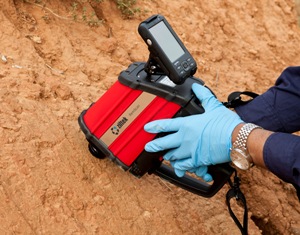May 20 2014
The device, RemScan, developed by CSIRO and industry partner Ziltek, uses an infrared signal to directly measure petroleum hydrocarbons in the soil, giving a result in around 20 seconds.
 The RemScan device can measure petroleum contamination in soil with a simple pull of the trigger. (Image: Ziltek)
The RemScan device can measure petroleum contamination in soil with a simple pull of the trigger. (Image: Ziltek)
The ability to rapidly and accurately detect petroleum contamination on site, instead of the traditional method of sending soil samples to a laboratory and waiting days for results, will enable industry to close projects or declare sites contaminant free, faster and with a greater degree of certainty. The technology has the potential to save the environmental remediation industry millions of dollars per year in laboratory and project costs globally.
Petroleum contamination as a result of leaking tanks or industrial spills is a widespread global issue with potentially serious impacts for human and environmental health.
RemScan can be used as a quick in-field screening tool to characterise contaminated sites, to validate spill clean-up areas, or to monitor ongoing contaminant degradation. In remote areas, where laboratory analysis is either not available or is prohibitively expensive – RemScan demonstrates its true value as a quick, easy to use and accurate instrument. The technology is particularly useful for the quantitative measurement of diesel, oil and crude products in soil, but can also be used as a screening tool for lighter fuels such as jet fuel and gasoline.
Successfully commercialised in Australia by Ziltek in 2012, RemScan is now in use by the mining industry and the oil and gas industries in various Australian states. CSIRO holds the recently accepted US patent for the RemScan method, which is licensed exclusively to Ziltek for global distribution.
CSIRO has significant expertise in advanced analytical methods to detect contaminants in soils, including new portable spectroscopic techniques for the rapid identification of a variety of soil properties. RemScan is one example of the commercial application of this expertise.
“CSIRO has enabled the use of infrared spectroscopy for rapid non-destructive prediction of contaminants in soils and soil properties using both near- and mid-infrared spectral regions,” CSIRO’s Professor Mike McLaughlin said.
“CSIRO also identified the potential of this new method to greatly reduce costs to industry and we saw Ziltek as the logical partner for global commercialisation."
Apart from oil detection, CSIRO is continuing to work with Ziltek to extend the technology to enable rapid detection of other soil contaminants.